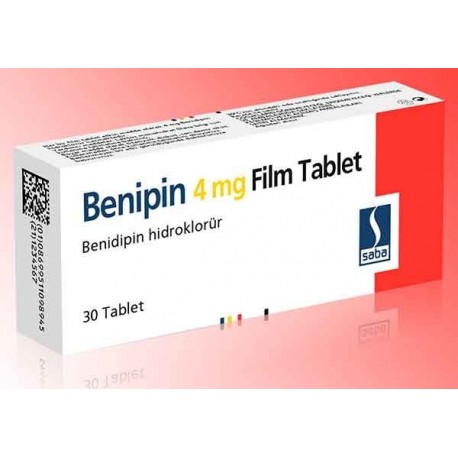 View larger
View larger Volume discounts
| Quantity | Discount | You Save |
|---|---|---|
| 2 | 5% | Up to $3.90 |
| 3 | 10% | Up to $11.70 |
| 4 | 15% | Up to $23.40 |
| 5 | 20% | Up to $39.00 |
More info
ENIPIN 8 mg film tablet Taken orally.
Active ingredient
Benidipine hydrochloride, 8 mg
Excipients
Lactose monohydrate, polyvinyl pyrrolidine K 30, pregelatinized starch, magnesium stearate, Opadry II 39F220003 yellow (titanium dioxide, yellow iron oxide, lactose monohydrate, HPMC 2910 / Hypromellose 15 cP, HPMC 2910 / Hypromellose 50 cP, HPMC 2910 / Hypromellose 50 cP, HPMC 2910 / Hypromellose / PEG 4000
2. What is BENIPIN and what is it used for?
BENIPIN is a blood pressure lowering drug containing benidipine hydrochloride active substance.
BENIPIN tablets each contain 8 mg benidipine hydrochloride and each box contains 30 tablets.
BENIPIN;
In hypertension (high blood pressure)
In renal parenchymal hypertension (high blood pressure caused by kidney disease)
Angina pectoris (chest pain caused by narrowing / obstruction of the vessels supplying the heart)
used.
3.How to use BENIPIN?
•
Instructions for appropriate use and dose / frequency of administration
1. Hypertension (high blood pressure) and renal parenchymal hypertension (hypertension caused by kidney disease);
Half or 1 tablet of BENIPIN is applied to adults once a day after breakfast. If this dose is not enough, your doctor may increase your dose up to 2 tablets per day, depending on your age and symptoms of your disease. In severe hypertension (high blood pressure) cases, 12 tablets of BENIPIN are given once a day after breakfast.
2. Angina pectoris (chest pain caused by narrowing / obstruction of the vessels supplying the heart);
Adults are usually given 1 tablet of BENIPIN twice a day after breakfast and dinner. Your doctor can adjust your dose according to your age and symptoms of your illness.
Application route and method
BENIPIN is for oral use only.
It is recommended to take BENIPIN with some water at the same time every day.
Different age groups
Use in children
It is not known.
Use in the elderly
There are insufficient data on dose adjustment in the elderly.
Special use cases
Renal insufficiency: There are insufficient data available on patients with renal impairment.
Liver failure: In patients with liver failure, BENIPIN should be used carefully and under the supervision of a doctor.
If you have an impression that the effect of BENIPIN is too strong or too weak, talk to your doctor or pharmacist.
If you use more BENIPIN than you should
If you use more BENIPIN than you should
If you have used more than you should use from BENIPIN, talk to a doctor or pharmacist.
If you forgot to use BENIPIN
Do not take a double dose to make up for forgotten doses.
Effects that may occur when treatment with BENIPIN is terminated
Abrupt discontinuation of BENIPIN treatment may cause exacerbation of the symptoms. Therefore, if you need to temporarily interrupt your BENIPIN treatment, your dose should be reduced gradually and your doctor should keep you under close observation. Do not interrupt your BENIPIN treatment without consulting your doctor.
4. What are the possible side effects?
Like all medicines, there may be side effects in people who are sensitive to the substances contained in BENIPIN.
If any of the following occur, stop using BENIPIN and IMMEDIATELY inform your doctor or contact the emergency department of your nearest hospital.
Swelling of the tongue, lips, larynx and related difficulty in breathing, shortness of breath, redness of the skin, itching, burning sensation.
An increase in BUN and creatinine (a substance used to monitor kidney function)
Pollakiuria (urinating too little and often)
Leukopenia (decrease in the number of white blood cells)
Eosinophilia (an increase in the number of eosinophils (a type of allergy cell) in the blood)
Low blood pressure
Pressure and burning sensation in the chest
Slow heart rate
Rapid heart rate
Extra heart beat
CPK rise
Low blood pressure seen when standing up from a sitting or lying position In addition, if you experience one of the following effects, your BENIPIN treatment should be discontinued.
SGOT, SGPT, a-GTP, bilirubin, alkaline phosphatase, LDH elevation
Skin rash
Itching
Sensitivity to light
Breast enlargement in men
All these are serious side effects. Immediate medical attention may be required.
Serious side effects are very rare.
If you notice any of the following, tell your doctor:
Palpitation
Facial rash
Hot flushes
Headache
Edema of the face, legs and hands
Dizziness
Dizziness
Insomnia
Numbness
Constipation
Abdominal pain
Nausea
Vomiting
- Diarrhea
Thirst
Malaise
Tinnitus
Feeling of redness and warmth in the fingers
Shoulder stiffness
Cough

